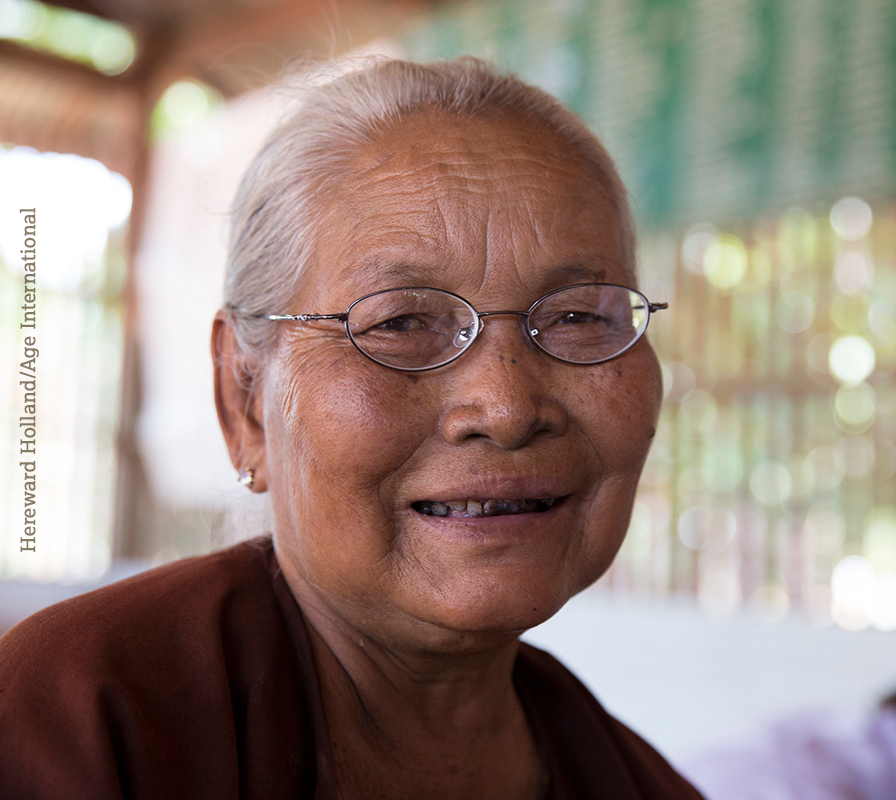Older people are campaigning for the right to be free from violence and abuse under international law on this World Elder Abuse Awareness Day. (Wednesday 15 June)
Studies show instances of elder abuse are widespread.[1]
In Cambodia, Chet Khub, 65 years old, was living with her daughter who has HIV and she experienced all forms of abuse; both physically and verbal from family and neighbours.
“My son-in-law often hurt me and my daughter when he got drunk. My daughter then ran away. She left me and her children with him. He had threatened to hurt me and my grandchildren if I run away from him too,” said Khub.
Elder abuse includes physical, sexual, financial, or psychological abuse and neglect. The incident can happen in the home or in institutions such as hospitals and nursing facilities. While older men are also at risk, cultures where women have inferior social status can make women even more at risk to abandonment, violence, and loss of legal rights.
In Thailand, Ms Khao, 78 years old, faced physical abuse. She was attacked at dawn on the way back home from a nearby market. Ms Khao hit with a weapon until she was unconscious. She has now recovered physically but she lives in fear everyday of being attacked again.
Despite the violence and abuse faced by many older people around the world, a lack of data exacerbates the problem.
“Elder abuse can be dangerously invisible as it is often a taboo subject and older people are often reluctant to report the abuse they are subjected to,” said Sleap. “We are calling for better data on violence and abuse to tackle this,” she said.
Government responses to elder abuse have been inadequate around the world. In 2014, a WHO, UNODC and UNDP Global Status Report on Violence Prevention reported that of the 133 countries surveyed only 17 per cent reported any survey data on elder abuse, and of these, the majority were in high-income countries[2].
“The obligation of governments to protect older people from abuse is not clearly stated in existing international human rights law. As a result, national laws to protect older people from violence and abuse are inconsistent and patchy, with some older people having little or no legal protection, no access to support services or to justice,” said Sleap.
Age Demands Action campaigners will be calling for their governments to attend the seventh session of the UN Open-ended Working Group on Ageing in December, prepared to talk about what they would like to see in a new convention on older people’s rights.
For member of ASEAN, we demand our governments to develop a regional action plan on ageing to implement the Kuala Lumpur Declaration on Ageing: Empowering Older Persons in ASEAN, endorsed at the 27th ASEAN Summit in Malaysia in 2015.
HelpAge International believes the time has come for an international convention on the rights of older people in order to ensure we live the end of lives and die with dignity.
[1] Dong, X.Q. (2015). Elder abuse: systematic review and implications for practice. Journal of the American Geriatrics Society, 63(6), 1214-1238
[2] http://www.who.int/violence_injury_prevention/violence/status_report/2014/en/
ENDS
Notes to editors
International Media Contacts:
Baralee Meesukh, Communications Manager, in Thailand on Tel: +66 (0) 53 225 440 Mobile: + 66 (0) 81 921 6462 Email: cee@helpageasia.org skype: baralee.meesukh
Panitee Nuykram, Public Relations Officer, on Tel: + +66 (0) 53 225 440 Mobile: + 66 (0) 82 455 5948 Email: panitee@helpageasia.org skype: panitee.nuykram
About HelpAge International
HelpAge International helps older people claim their rights, challenge discrimination and overcome poverty, so that they can lead dignified, secure, active and healthy lives. Our work is strengthened through our global network of like-minded organisations – the only one of its kind in the world.
Age Demands Action is a grassroots campaign challenging age discrimination in over 60 countries. This year two new partners in Liberia and Nigeria will join ADA for the first time. Today’s actions follow on from 1 October when older people came together to celebrate ageing and call for a convention protecting their rights.
ASEAN is the Association of Southeast Asian Nations, a political and economic organisation of ten countries namely Brunei, Cambodia, Indonesia, Laos, the Philippines, Myanmar, Malaysia, Singapore, Thailand and Vietnam. Kuala Lumpur Declaration on Ageing: Empowering Older Persons in ASEAN was endorsed at the ASEAN summit held in Malaysia in 2015. View full declaration here: https://ageingasia.org/special-interview-kl-declaration-on-ageing/
For more information on the actions or the ADA campaign, visit: http://www.helpage.org/get-involved/campaigns/age-demands-action/
Follow the conversations on 15 June with #WEAAD and #WEAAD2016

